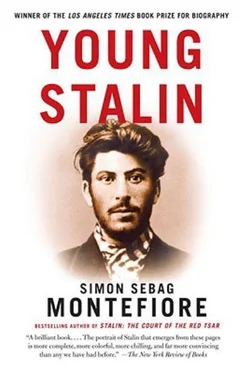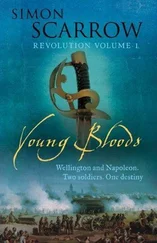The Ossetians were a semi-pagan mountain people who lived on the northern borders of Georgia proper, some becoming assimilated Georgians though most remain proudly separate: in 1991–93, South Ossetians fought the Georgians and are now autonomous. When Stalin’s dying father was admitted to hospital, significantly he was still registered as Ossetian. Stalin’s enemies, from Trotsky to the poet Mandelstam in his famous poem, relished calling him an “Ossete” because Georgians regarded Ossetians as barbarous, crude and, in the early nineteenth century, non-Christian. Djugashvili certainly sounds as if it has an Ossetian root: it means “son of Djuga” in Georgian. Stalin’s mother says Beso told her the name was based on the Georgian djogi , or “herd,” root because they were herdsmen and were driven out of Geri by marauding Ossetians. The real relevance is lost because, by the time of Stalin’s birth, the Djugashvilis were totally Georgianized. Stalin himself wrote about this: “What is to be done with the Ossetians… becoming assimilated by the Georgians?”
Stalin later invented much about his life: his official birthday was 21 December 1879, over a year later, an invented date. He generally stuck to 6 December 1878 until an interview in 1920 with a Swedish newspaper. In 1925, he ordered his secretary Tovstukha to formalize the 1879 date. There are several explanations, including his desire to re-create himself. Most likely, he moved the date later to avoid conscription. As for the house where he was born, this is the hovel that now stands alone on Gori’s Stalin Boulevard, surrounded by the Grecian temple built during the 1930s by Stalin’s Caucasian viceroy and later secret police chief, Lavrenti Beria, next to the cathedral-like Stalin Museum. The Djugashvilis did not live there long.
Stalin the dictator became a keen gardener, growing lemons, tomatoes and, above all, roses and mimosas. His favourite Georgian songs were “Fly Away Black Swallow” and “Suliko.”
These Georgian inns “provide nothing but unfurnished and dirty rooms, bread (with cheese), tea, wine and at best eggs and poultry,” warns German travel-book publisher Karl Baedeker. “Those who wish for meat must buy a whole sheep (4–5 roubles) or suckling pig (2–3 roubles).”
For what it is worth, Adolf Hitler was beaten by his drunken father, Alois. Stalin did not become a wife-or child-beater, although he was a destructive husband and father. He was at least partly to blame for the early deaths of both his wives. He abandoned his illegitimate children, ignored his son Yakov for almost fifteen years and then bullied him. Of the children of his second marriage, he both overpromoted and crushed his son Vasily. He sometimes smacked him but then the dictator’s son developed into a spoiled and unmanageable little tyrant himself. Vasily became a hopeless alcoholic, the condition perhaps inherited from Beso. Stalin was loving to his daughter, Svetlana, until she became independent: he once slapped her as a teenager—but only when she was having an affair with a married womanizer in his forties. For the story of his second marriage and the fate of his children, see this author’s Stalin: The Court of the Red Tsar .
Dato was still a cobbler fifty years later, in 1940, when Stalin ordered one of the Egnatashvilis to invite him to Moscow for a reunion. See Epilogue.
The school still stands in Gori and was being renovated in 2006: until Khrushchev’s denunciation of Stalin in 1956 it bore the inscription HERE IN THE FORMER CHURCH SCHOOL THE GREAT STALIN STUDIED FROM 1 SEPTEMBER 1888 TO JULY 1894.
This is one of the reminiscences of Peter Kapanadze, Stalin’s close friend with whom he maintained friendly contact. Kapanadze’s very complimentary memoirs were published in the 1930s but this was one of the details that were left out of the official version—it appears in the archival original.
This damaged left arm is variously blamed on a sledge accident, a birth defect, a childhood infection, a wrestling injury, a fight over a woman in Chiatura, a carriage accident and a beating from his father, all (except the birth defect) suggested by Stalin himself. There is much confusion about Stalin’s accident probably because there were in fact two accidents: there was this, less serious accident when he had just started school (according to Keke) or aged six (according to later health reports), which probably damaged the arm, an injury that became more noticeable in old age. Then, not long afterwards, there was a much graver accident in which he was seriously hurt and for which he needed treatment in Tiflis: this damaged his legs. In her memoirs Keke, aged eighty, seems to have merged them together.
Hence it was surrounded by the estates of semi-royals like the Princes Bagration-Mukhransky and grandees such as Prince Amilakhvari. The Georgian nobility was enormous—6 percent of the population—but impoverished and therefore much less isolated than in Russia proper. The viceroy of the Caucasus, Grand Duke Mikhail Nikolaievich, brother of Alexander II, built his Gothic Likani Palace nearby at Borzhomi, where these Romanovs summered until the Revolution. When Stalin rose to power, he showed little interest in returning to Gori, but spent the first holiday after the Civil War with his young pregnant wife, Nadya Alliluyeva, at the Likani Palace. It is significant too that, as his health deteriorated, he took his last Georgian holiday in 1951 at Likani. It was and is a beautiful sanctuary, but it must also have symbolized the success of a local boy made good. It is now the summer residence of the Georgian President.
Even the old Stalin prided himself as a macho wrestler: when he met Marshal Tito after the Second World War, the handsome Yugoslav somehow made Stalin feel older and weaker. He suddenly lifted Tito off the ground, boasting, “There’s still strength in me.” The Yugoslavs were appalled and bewildered, but here was his last display of Gori wrestling.
These stories by Giorgi Elisabedashvili and his cousin Sandro of the vicious little urchin abusing and almost ruining the livelihood of an industrious workingman or streetfighting are found in the archives, but naturally they never appeared in Stalin’s biographies and remain unpublished.
This foolish decree not only started Stalin on the road to rebellion but also ensured that his Russian, despite the strong Georgian accent which he never lost, was of a high enough standard that he could plausibly rule the Russian Imperium.
School Inspector Butyrsky was typical—a dwarfish, rotund martinet with red moustaches. When he heard Georgian spoken, he shouted: “Don’t speak that language!”
As a politician, Stalin was the consummate actor. Those magnates who knew him well in power felt he was often acting: Khrushchev called him a “man of faces;” Kaganovich remarked that there were four or five different versions of Stalin; Mikoyan and Molotov both sensed at various times that Stalin was just playacting. As for the drawing, the only relic of this was his habit of sketching wolves during long meetings.
All his life Stalin demanded that his subordinates be as prepared as he was: his deputy in the 1930s, Lazar Kaganovich, said he would prepare for meetings with Stalin like a schoolboy. In the archives there is a handwritten note from Stalin to his comrade Sergo Ordzhonikidze from the 1930s when they were the two most powerful Soviet leaders: “Sergo, tomorrow meeting on bank reform. Are you prepared? Necessary to be prepared.” During the Second World War, he tore to shreds anyone who was not fully prepared.
Читать дальше












